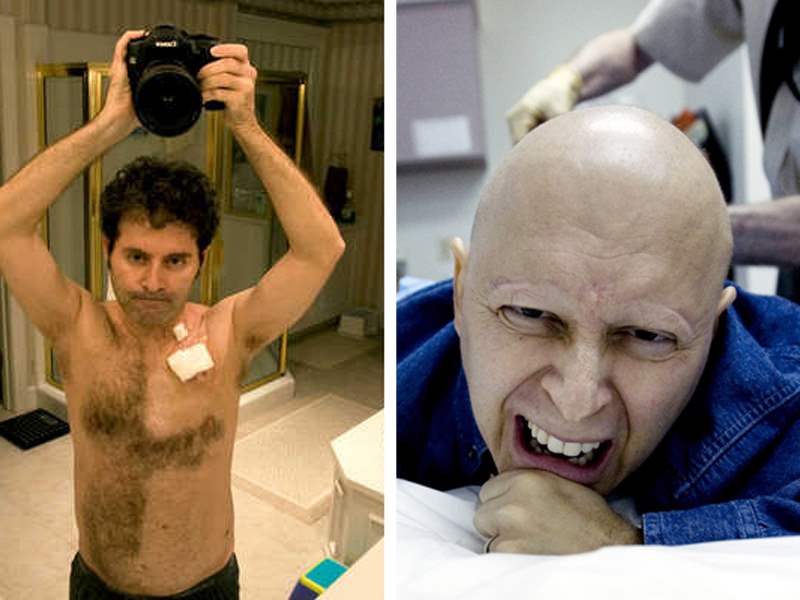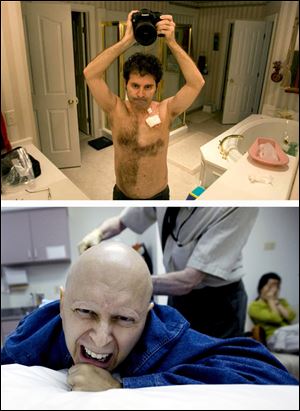
Cancer not a movie cliche
Pulitzer Prize-winning photographer chronicles his bout with Lymphoma
9/14/2011
Visceral images of cancer patients bravely battling their disease are newspaper contest cliches.
Jaded journalists call them "Yet Another Cancer Story."
And Pulitzer Prize-winning photographer John Kaplan has one himself with Not as I Pictured, a new documentary that chronicles his 2008 battle with a potentially deadly Lymphoma.
"Getting back to the cliche, I didn't really think about that," he said. "I just knew that somehow this work was going to get out there and it was going to help other families as well."
Not as I Pictured is a 54-minute testament to Kaplan's unyielding will to watch his two young children grow up after receiving the somber news. He dutifully endures chemotherapy treatments and the loss of his hair, and struggles to find humor and joy through the pain.
He quickly learns to appreciate every moment with his family and friends, while he engages in a literal battle to save his life.

Photojournalist John Kaplan chronicled his bout with cancer through photos and a short movie that airs at 3 p.m. Wednesday on WGTE-TV.
Not as I Pictured airs at 3 p.m. Wednesday on WGTE-TV, Channel 30, and also is available on DVD. For more information on the film — including how to receive a free copy — visit NotAsIPictured.org or facebook.com/NotAsIPictured.
Kaplan, 52, said he initially began to chronicle in pictures and video his life with cancer as a coping mechanism with his fear of the disease. Others suggested he write a journal about his experiences.
Kaplan, a former photographer with The Blade's sister paper, the Pittsburgh Post-Gazette, from 1990 through 1994 (he won the Pulitzer for Feature Photography in 1992 for a project titled "Age 21 in America," a series of photos exploring the diverse lifestyles of 21-year-olds in the United States), has been a journalism professor for 13 years at the University of Florida.
Making the documentary was contrary to what he preached in the classroom.
"I never recommend to my students that they do stories about themselves," Kaplan said. "It can be self-serving and kind of defeats the purpose of our role in the community. However, as I started this process, I realized that I didn't mind seeing myself not at my best physically and showing my personal vulnerabilities. After all, this is not something we ask for, and at the same time there is nothing we did wrong to become ill. So I felt by sharing that, again I had nothing to be ashamed of."
Kaplan considered nothing off limits for Not as I Pictured; his only stipulation: "I would stop if the process that I became engaged in was competing with the far more important quest to get well."
He shot most of the documentary himself and avoided bringing in video camera crews. He started with a zero budget and found financial help along the way.
Since its release, Not as I Pictured has provided hope and inspiration to patients and caregivers, he said, that cancer is no longer an automatic death sentence and that many forms of the disease are increasingly becoming treatable and even curable. The film also has become a tool in cancer eduction as part of a new medical movement, humanism in medicine.
"Don't treat the patient as just a chart, just a case, just from the clinical perspective, but also realize that you're dealing with a real human being with hopes, expectations, and vulnerabilities," Kaplan said. "The film is already being used in several hospitals, and survivorship programs ... and it's thought to be of use in the future in medical humanities courses as well."
Not as I Pictured has a happy ending. Kaplan went into remission at the end of 2008 — the film shares that poignant moment when he and wife Li learn the good news in the doctor's office — and his health remains great, he said, after continuing chemotherapy treatments through November, 2010.
"You never say never with cancer's recurrence; lymphomas can be pesky. They naturally metastasize because they spread through the lymph node system of your body, but I don't dwell on that," he said. "I just want to be there for my family, for my students. This humanitarian public service project is also a big part of my own healing.
"I said to myself every day — and I still do — ‘Every day is a blessing, every day is a gift.' ... If I could get well I was going to end the movie with a big thumbs-up and saying that mantra that became an important part of my past.... And that's a cliche: a thumbs-up end of the movie."
Contact Kirk Baird at: kbaird@theblade.com or 419-724-6734.